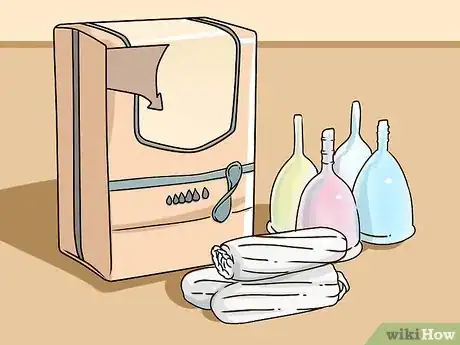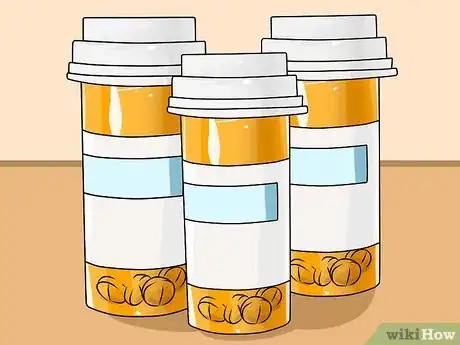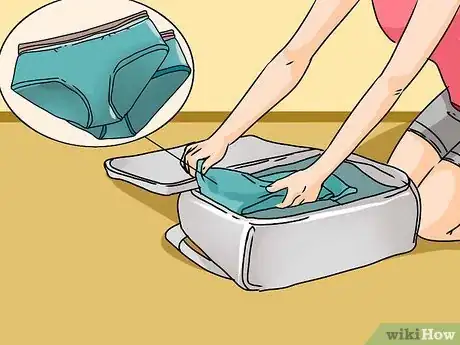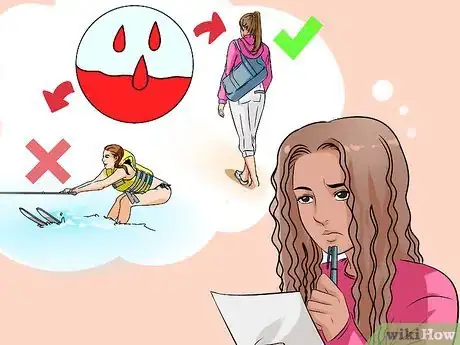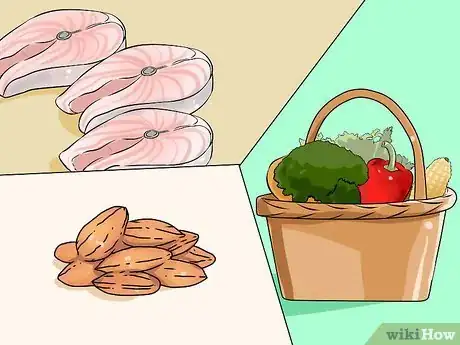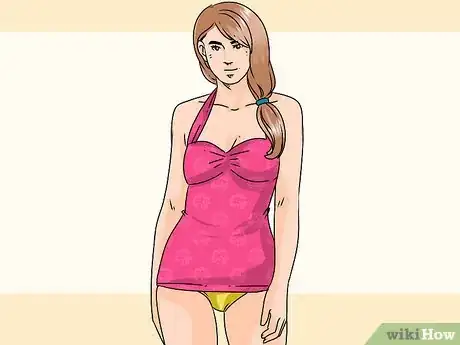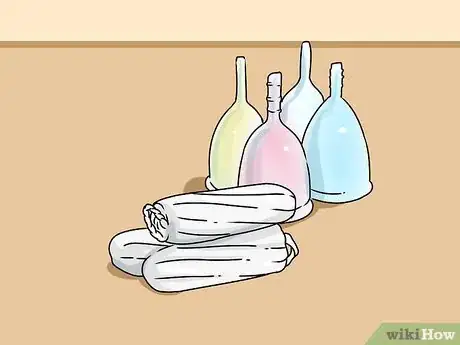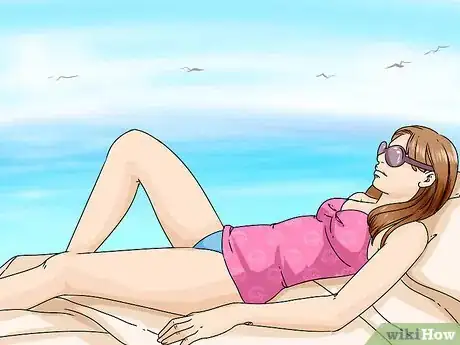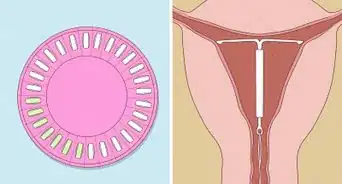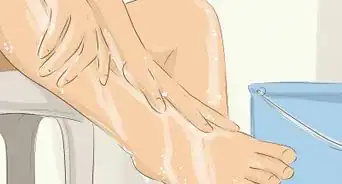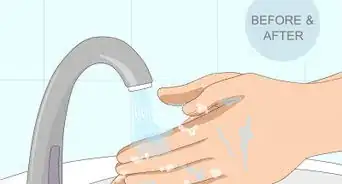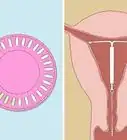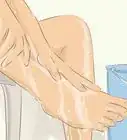This article was co-authored by Rebecca Levy-Gantt, MPT, DO. Dr. Rebecca Levy-Gantt is a board certified Obstetrician and Gynecologist running a private practice based in Napa, California. Dr. Levy-Gantt specializes in menopause, peri-menopause and hormonal management, including bio-Identical and compounded hormone treatments and alternative treatments. She is also a Nationally Certified Menopause Practitioner and is on the national listing of physicians who specialize in menopausal management. She received a Masters of Physical Therapy from Boston University and a Doctor of Osteopathic Medicine (DO) from the New York College of Osteopathic Medicine.
There are 8 references cited in this article, which can be found at the bottom of the page.
wikiHow marks an article as reader-approved once it receives enough positive feedback. In this case, 100% of readers who voted found the article helpful, earning it our reader-approved status.
This article has been viewed 246,640 times.
Have you planned the perfect vacation and then you get your period? Having your period on vacation might be frustrating but there are many ways to stay comfortable. Pack your feminine hygiene products, extra underwear, and painkillers. Stay hydrated and have a good time!
Steps
Preparing for Your Trip
-
1Bring feminine hygiene products. Whether you use tampons, pads, or a menstrual cup, be sure to pack plenty of supplies prior to your vacation. Overestimate the number of products you will need as you do not want to run out. For example, if at home, you usually use four tampons a day, bring six per day. If you unexpectedly get your period on vacation, visit a drug store to purchase your supplies. Alternatively, you could ask a friend to give you some items.[1]
- Some countries will not have the same supplies available that you normally use. For example, in Central Europe, it is more difficult to find tampons with applicators and in Asia, it would be hard to find tampons at all.
-
2Pack painkillers. If you expect that your period will start prior to or during your trip, bring painkillers. Ibuprofen or aspirin can reduce cramps.[2] Naproxen sodium (e.g. Aleve) and Midol are also good options. Midol particularly works to reduce bloating in addition to relieving pain.[3] Keep in mind that in some countries (for example, Germany) you cannot buy painkillers over-the-counter. You are, however, allowed to bring medication with you in your checked luggage. If traveling to countries that limit access to painkillers, be sure to pack enough for the duration of your period.[4]
- Follow the instructions on the medication packaging. Do not overdose. Also, talk to your doctor if you are using any other prescription medication.
- Although it is not medication, a disposable heat pad can be useful to have. These pads often include adhesive tape and stick to your abdominal area.
Advertisement -
3Pack appropriate clothing. If you know your period will arrive on vacation, take care to pack correct clothing. For example, add a few extra pairs of underwear to your list. Also, think about what clothing options are the most comfortable during your time of month. Flowing skirts might be preferable to tight skinny jeans. Having extra shorts to wear under your skirts might make you feel more secure as well.
- Packing for comfort does not mean packing to be sloppy. Keep in mind your destination and any applicable dress codes.
- Waterproof underwear can help you prevent leaks on long days out.
-
4Plan your days wisely. If at all possible, plan your trip to maximize your comfort. This will depend on how you normally feel on your period. For example, if you know the first day of menstruation tends to be very rough, do not plan any adventurous activities on that day. Avoid strenuous hikes or excessively long walks. Going to a sauna where you must remove your swimsuit is also not a great option. Instead, use your first period days to do short walks around your area, go to movies, or do other less active things.
- Not all vacations offer this flexibility. There are other things you usually can control, however, like how much sleep you get. If you feel extra tired on your period, try to sleep earlier and/or later if possible.
-
5Prepare for sex. If you will be on your honeymoon, for example, and your period arrives, you can still enjoy intimacy with your partner. Pack old dark towels to use, as you might feel uncomfortable having fun on a hotel's white sheets. Look at Have Sex During Your Period for additional tips.
Traveling While Menstruating
-
1Prepare a daily kit. When taking day trips on vacation, it is important to have your period supplies with you in your purse or backpack. Create a daily pack with your tampons, pads, or other menstrual hygiene products. Add the amount of painkillers you might use plus an extra pair of underwear. Adding a small pack of wet wipes can help you feel clean and refreshed too.
- If traveling by plane, put these items in your carry-on baggage. If traveling by car, keep your kit in the main cabin rather than in the trunk.
- If you are hiking or camping and there will not be trash cans, add a resealable plastic bag to your kit. You can use the bag to hold your used products and then dispose of them later.
-
2Stay hydrated. When you are out and about especially in the heat, it is important to drink plenty of clear liquids like filtered water. 2.2 Liters (9 cups) of fluids is the daily recommendation for women.[5] If you are outside in heat, you might need to increase your water intake.
- Bring a reusable water bottle for plane rides, day trips, or car rides.
- Be sure to drink plenty of water while flying. The humidity in the cabin can drop to 20%, which can make you feel dehydrated.[6]
-
3Eat appropriate foods. Try to eat nutritious, healthy foods during your period. Although this can be difficult on vacation, opt for salads, fresh fruits, and whole grains instead of fried and salty foods. Make sure you are getting enough protein. Iron deficiency is also possible for women who have very heavy periods.[7] To make sure you are getting enough iron, try eating more:
- Red meat (beef for example)
- Poultry
- Fish
- Nuts
- Leafy green vegetables[8]
-
4Schedule restroom breaks. If possible, plan when you will take restroom breaks to check the status of your feminine hygiene products. For example, you might plan to have a morning coffee, lunch break, and afternoon snack. Cafes and restaurants normally have restrooms to use. If you are visiting a location where one must pay to use the toilet, be sure to have suitable change with you.
- When taking long-haul flights or driving for a long time, be sure to go to the bathroom every few hours as well. This will help your circulation and muscles as well!
- If you are on a long flight or drive, it's very important to change your pad or tampon regularly to avoid unpleasant odors and Toxic Shock Syndrome.
Swimming While Having Your Period
-
1Wear a comfortable swimsuit. When you have your period, it is best to wear a swimsuit with bottoms that provide a bit more coverage. In other words, string bikinis might not be a good choice! Choose a swimsuit that is also not super tight, as you might be bloated.
- If you are concerned about leakage, choose a dark-colored bathing suit or wear waterproof shorts over your bottoms. Athletic shorts can work well for this purpose.
-
2Use a tampon or menstrual cup. To avoid bleeding into the water or having leaks when you exit the pool, try using a tampon or menstrual cup. They will help keep your flow contained. If you prefer to not use a tampon, see the article Swim on Your Period Without a Tampon.
-
3Sunbathe. If you are not feeling well and don't want to go in the water, consider sunbathing. Be sure to wear sunscreen! Relaxing in a chair might be the best thing for any menstrual cramps. For more tips see: Swim when You Are on Your Period
Expert Q&A
Did you know you can get expert answers for this article?
Unlock expert answers by supporting wikiHow
-
QuestionWhy do painkillers help with your period?
 Rebecca Levy-Gantt, MPT, DODr. Rebecca Levy-Gantt is a board certified Obstetrician and Gynecologist running a private practice based in Napa, California. Dr. Levy-Gantt specializes in menopause, peri-menopause and hormonal management, including bio-Identical and compounded hormone treatments and alternative treatments. She is also a Nationally Certified Menopause Practitioner and is on the national listing of physicians who specialize in menopausal management. She received a Masters of Physical Therapy from Boston University and a Doctor of Osteopathic Medicine (DO) from the New York College of Osteopathic Medicine.
Rebecca Levy-Gantt, MPT, DODr. Rebecca Levy-Gantt is a board certified Obstetrician and Gynecologist running a private practice based in Napa, California. Dr. Levy-Gantt specializes in menopause, peri-menopause and hormonal management, including bio-Identical and compounded hormone treatments and alternative treatments. She is also a Nationally Certified Menopause Practitioner and is on the national listing of physicians who specialize in menopausal management. She received a Masters of Physical Therapy from Boston University and a Doctor of Osteopathic Medicine (DO) from the New York College of Osteopathic Medicine.
Board Certified Obstetrician & Gynecologist A lot of people assume they'll bleed more when they take something like Motrin or ibuprofen, but think about that category of medicine. They're non-steroidal anti-inflammatories. So if you take them right when your period is about to start, they'll actually cut back on the amount of bleeding you experience.
A lot of people assume they'll bleed more when they take something like Motrin or ibuprofen, but think about that category of medicine. They're non-steroidal anti-inflammatories. So if you take them right when your period is about to start, they'll actually cut back on the amount of bleeding you experience.
Warnings
- See a doctor if your period symptoms seem worse than normal while on vacation. For instance, if you are vomiting violently, you might have food poisoning rather than menstrual cramps.[10]⧼thumbs_response⧽
Things You'll Need
- Plenty of pads and tampons
- Menstrual cup (optional)
- Painkillers
- Spare underwear
- Water
References
- ↑ Rebecca Levy-Gantt, MPT, DO. Board Certified Obstetrician & Gynecologist. Expert Interview. 3 April 2020.
- ↑ http://www.nhs.uk/Conditions/Periods-painful/Pages/Treatment.aspx
- ↑ http://www.drugs.com/cdi/midol-maximum-strength-menstrual.html
- ↑ Rebecca Levy-Gantt, MPT, DO. Board Certified Obstetrician & Gynecologist. Expert Interview. 3 April 2020.
- ↑ http://www.mayoclinic.org/healthy-lifestyle/nutrition-and-healthy-eating/in-depth/water/art-20044256
- ↑ http://www.telegraph.co.uk/travel/723733/What-happens-to-your-body-when-you-fly-and-how-to-beat-the-pain.html
- ↑ http://www.irondisorders.org/women
- ↑ http://www.betterhealth.vic.gov.au/bhcv2/bhcarticles.nsf/pages/Nutrition_womens_extra_needs?open
- ↑ Rebecca Levy-Gantt, MPT, DO. Board Certified Obstetrician & Gynecologist. Expert Interview. 3 April 2020.
About This Article
If you’re going to have your period while on vacation, pack plenty of extra supplies, including feminine hygiene products and painkillers like ibuprofen or Midol to help with cramps. You should also pack some extra underwear and some comfortable clothing options. Put together a small kit with pads or tampons that you can easily take with you when you’re out and about while traveling. Also, if you can, find out ahead of time where there will be restrooms at the places you’ll be visiting. For more tips on dealing with your period on vacation, like how to go swimming, keep reading!
